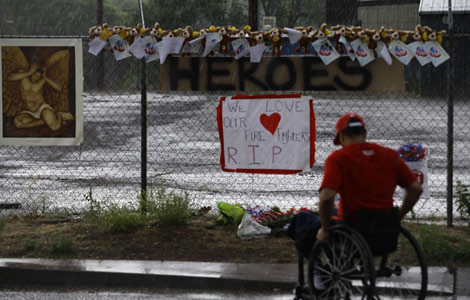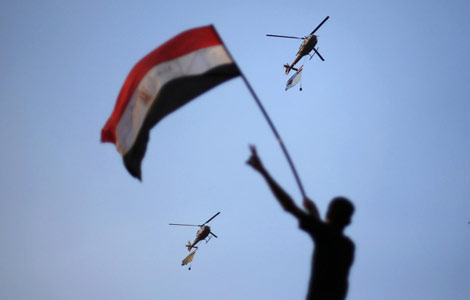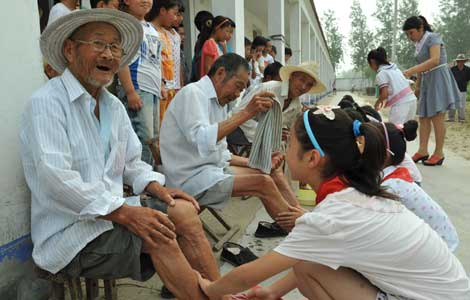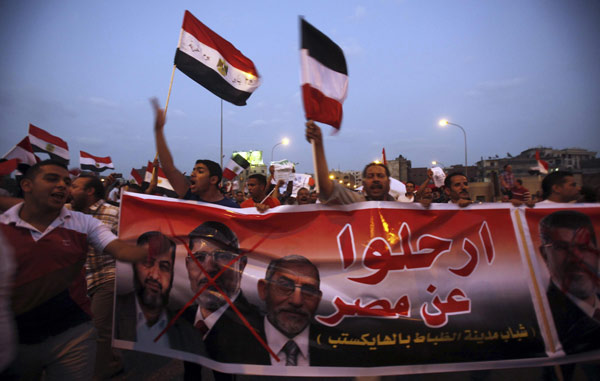Egypt's army set to oust Mursi as clock ticks
Updated: 2013-07-03 07:15
(Agencies)
|
||||||||
TROOPS
The confrontation has pushed the most populous Arab nation closer to the brink of chaos amid a deepening economic crisis two years after the overthrow of Hosni Mubarak, raising concern in Washington, Europe and neighbouring Israel.
Troops intervened to break up clashes in the Mediterranean city of Alexandria. They were also out on the streets of Suez and Port Said, at either end of the Suez Canal. The waterway is vital to world trade and to Egypt's struggling economy.
Mursi was looking increasingly isolated as ministers and officials who are not members of his Muslim Brotherhood resigned. He also lost a judicial battle when a court evicted his prosecutor-general and reinstated a Mubarak appointee.
Egypt's Coptic Pope, spiritual leader of the country's 10 percent Christian minority, expressed open support for the anti-Mursi Tamarud (Rebel) movement in a tweet, voicing support for the trio of people, army and youth.
The leading Muslim religious authority, Al-Azhar, called for the will of the people to prevail peacefully.
Mursi met Sisi for a second day, his office said, along with Prime Minister Hisham Kandil. A presidential aide told the state news agency there had been no "disagreements" but there was no outward sign of a meeting of minds.
Though Mursi has held out repeated offers of dialogue, liberal opponents accuse him and the Brotherhood of bad faith and have ruled out starting talks with him before the deadline.
After that, former U.N. nuclear agency chief Mohamed ElBaradei will deal directly with the military on behalf of the main coalition of liberal parties. Also planning to take part are leaders of the Tamarud youth movement, which initiated mass rallies on Sunday that the army says prompted it to act.
Military sources said the armed forces would talk with the opposition National Salvation Front and other political, religious and youth organizations after the deadline.
Among figures being considered as an interim head of state was the new president of the constitutional court, Adli Mansour.
The new transition arrangements would be entirely different from the military rule that followed Mubarak's fall and more politically inclusive, the sources said.
Then, the ruling armed forces' council was widely criticized by liberal and left-wing politicians for failing to enact vital economic and political reforms - and for siding with the Brotherhood.

 Beckhams' star power shines
Beckhams' star power shines
 Worried parents drive imported milk sales
Worried parents drive imported milk sales
 Rumbia subsides but still brings heavy rain
Rumbia subsides but still brings heavy rain
 Fire engulfed Arizona firefighters in seconds
Fire engulfed Arizona firefighters in seconds
 Yao Ming, McGrady team up for charity
Yao Ming, McGrady team up for charity
 Egypt's Mursi rebuffs army ultimatum
Egypt's Mursi rebuffs army ultimatum
 No quick end in sight for Beijing smog
No quick end in sight for Beijing smog
 New filial law sparks debate
New filial law sparks debate
Most Viewed
Editor's Picks

|

|

|

|

|

|
Today's Top News
'Positive' sign on Asia-Pacific free trade pact
US delays major requirement of health law
Venezuela eyed as Snowden's asylum
FM responds to Manila's accusations
Prosecution wraps up Wikileaks case
Credit crunch hits smaller firms
Recovery on horizon for rare earth sector
Earlier treatment for HIV sufferers
US Weekly

|

|







